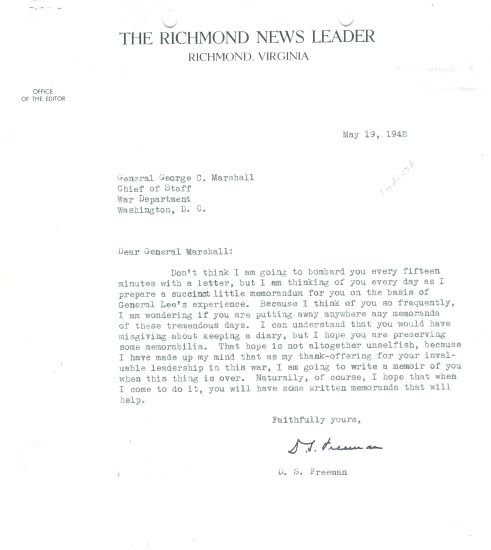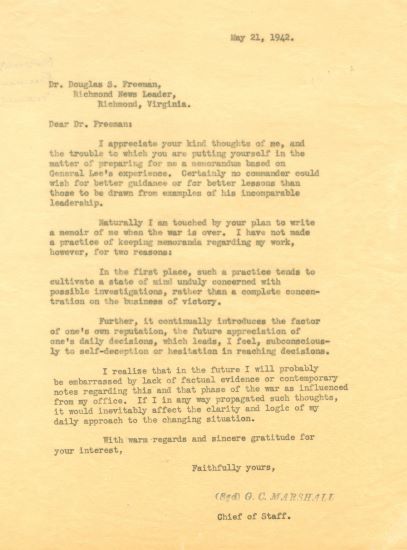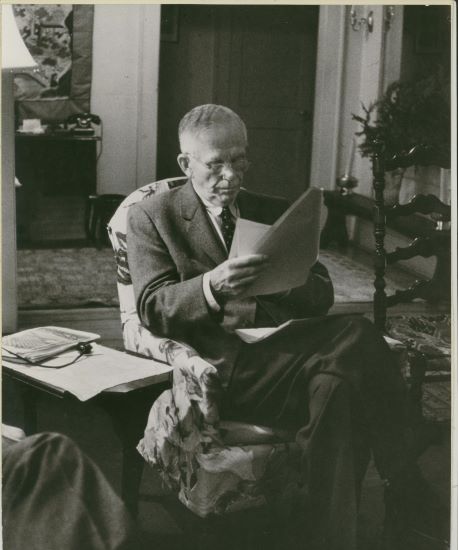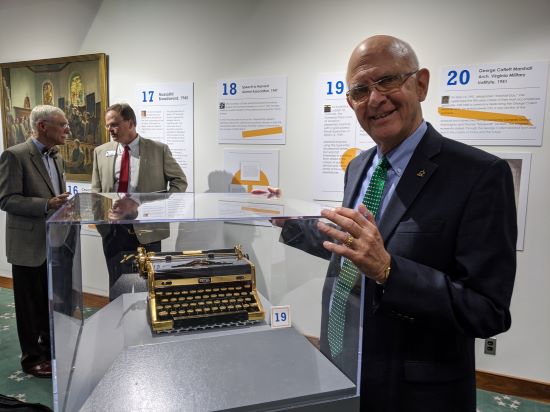George Marshall adamantly refused to write his memoirs because he said that doing so tended to make one concerned about justifying their actions and protecting their reputation. He also said that he would have to tell the truth about people if he wrote his memoirs, and that could ruin the reputations of some individuals. He said at one point that he could not be forced to “walk to the end of a plank” by commenting about the memoirs of others.
Douglas S. Freeman, the noted biographer of Robert E. Lee, advised Marshall in 1942 to keep memoranda about World War II, lamenting the fact that Lee had not kept any papers or written any memoirs. Marshall dictated a response for his aide Frank McCarthy to reply to Freeman: “My policy has been not to do this, for two reasons. In the first place it tends to cultivate a state of mind unduly concerned with possible investigations, rather than a complete concentration on the business of victory. Further, it continually introduces the factor of one’s own reputation, the future appreciation of one’s daily decisions, which leads, I feel, subconsciously to self-deception or hesitations in reaching decisions. I realize that in the future I will probably be embarrassed by lack of factual evidence or contemporary notes regarding this and that phase of the war as influenced from my office. If I in any way propagated such thoughts, it would inevitably affect the clarity and logic of my daily approach to the changing situation.”


The correspondence referred to between Douglas S. Freeman and Marshall.
William Frye of the Associated Press was under contract to Bobbs-Merrill to write Marshall’s biography in 1944 because the president of Bobbs-Merrill felt that the public needed to know that their trust in Marshall was not misplaced and that the biography would garner more public support for Marshall. He refused to cooperate, saying that his relations with the Army would suffer from such publication. Frye suspended his research, and his book, Marshall: Citizen Soldier, was published in 1947.
At a press conference in 1948, Marshall refused to comment about opinions in British newspapers about General Dwight Eisenhower’s memoirs. “I have not written any book now and I am not going to talk about any other fellow’s book,” Marshall stressed. ‘You are not going to get me on the end of a plank.”
Marshall wrote to Professor Harvey DeWeerd of the University of Missouri later in 1948, in response to DeWeerd’s offer to help Marshall if he decided to make his papers available to the public. Marshall told him that his papers were available at the State Department. If the papers were to be published, Marshall said, “I would prefer to have you do the job, but as for myself I will not participate as I wish to free myself completely from such at least semiofficial responsibilities.” Marshall told a publisher in 1949 that he would not name a possible author for his biography because he had “no intention of becoming involved in any such enterprise.”
In 1950, he said that his memoirs would be worthless to history unless they told the entire story. If he put everything in, he said, he would ruin the reputations and careers of living men. “I long ago made up my mind that I was not going to write any memoirs. To be of any historical importance, they have got to be very accurate. That is, you mustn’t omit and make it pleasant reading. Now, if you do put it all in, you may do irreparable harm. Inevitably the press reaction – the public reaction – devotes itself to the critical item, although it may be only one paragraph in the entire book. You almost ruin a man. But if you don’t mention that, it is not history because it had a very important bearing on the procedure.”
Luther Evans, Librarian of Congress, wrote to Marshall in 1951, hoping that Marshall would give his personal papers to the Library of Congress. Marshall penned a response on an American Red Cross notepad: “I refrained throughout the war and as Secretary of State from expressing views on national or international affairs in personal or semi-official correspondence. I did this because of the inevitable hazards regarding publicity and, as to my military correspondence, to avoid any chance of confusion in the minds of the recipients between what I wrote and the campaign directives from the Operations Section over my signature. For example, Eisenhower wrote me frequently and at considerable length but I seldom if ever replied using personal correspondence. His letters are in the official files. The answers are a part of the subsequent directives. I will consider the matter further, but I see little of historical interest involved, and have the impression that my actions were few, far between, and relatively colorless.”
Marshall was persuaded in 1956 to sit for interviews with Army historian Dr. Forrest Pogue, and the interviews became the basis for Pogue’s four-volume biography of Marshall. Pogue’s experience with the interviews will be the subject of a future blog in this series.

Marshall reading a document during a taping session with Dr. Forrest Pogue, winter of 1957 at Liscombe Lodge, Pinehurst, NC.
Despite Marshall’s feelings about the genre, a Marshall memoir does exist. Molly Winn, his stepdaughter, was compiling a scrapbook of pictures and news clippings about Marshall for his birthday in 1944 when she discovered a manuscript of a draft that he had written about World War I. He told her that a publisher wanted revisions, but he had not had the time to revise it. He told her to destroy the manuscript, but a copy survived, and Molly had it published in 1976: Memoirs of My Services in the World War, 1917-1918. (nb — available on the Marshall Foundation site here.

Tom Bowers, shown with the gold-plated typewriter Marshall was given as an inducement to write his memoirs, is the former docent director at George Marshall’s Dodona Manor in Leesburg, Virginia. He was professor and dean of the School of Journalism and Mass Communication at the University of North Carolina at Chapel Hill from 1971 to 2006.
